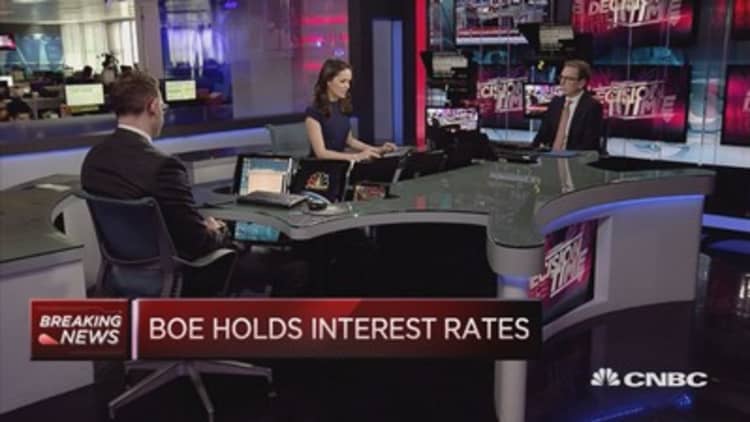
The Bank of England (BOE) held interest rates steady at 0.25 percent, as expected, on Thursday while implementing some widely anticipated modifications to its growth and inflation assumptions over the three-year forecast horizon.
Meantime, the Bank maintained stock levels of government bonds and corporate bonds at £435 billion and £10 billion, respectively, also as expected.
Governor of the Bank of England, Mark Carney, said the decision reflected the impact that slowing wage growth and rising inflation has had on near-term household spending and gross domestic product (GDP) growth forecasts.
"The Committee judges that consumption growth will be slower in the near-term than previously anticipated, before recovering in the latter part of the forecast as real incomes pick up," he said in a press briefing following the announcement.
While the BOE was widely seen holding rates steady at 0.25 percent, speculation had centered on whether committee member Kristin Forbes would maintain her dissenting vote for a 25 basis point rise in interest rates as per her stance at the March meeting - and if so, whether she would be joined by one or two more policymakers, most likely seen to be Michael Saunders or Ian McCafferty.
In the end, Forbes remained the sole dissenter with a resulting 7-1 split among policymakers (the committee is currently one member short as Charlotte Hogg's seat has not been filled since her recent resignation).
Sterling dropped lower on the news with the 7-1 split seen as fairly dovish by the market. The currency slipped to 1.288 against the dollar after trading near 1.292 before the announcement.

Growth downgrade
Despite first-quarter GDP coming in at 0.3 percent and undershooting the BOE's February estimate that the figure would hit 0.5 percent, the central bank's forecasters have only reduced the outlook for 2017 growth to 1.9 percent from 2.0 percent.
Looking ahead, the Bank has made further tweaks to estimates, upping GDP projections for 2018 and 2019 by 0.1 percentage points each, to 1.7 percent and 1.8 percent, respectively.
Behind the headline figures, however, the BOE's perception of the balance of growth has altered, partly in light of a consumer slowdown hitting growth earlier and more substantively than previously expected.
This negative development has been largely offset, according to the BOE, by more optimistic prospects for global growth - and therefore U.K. exports - and the appetite of U.K. businesses to continue investing, despite headwinds posed by uncertainty over the U.K.'s impending departure from the European Union (EU).

Inflation forecasts have also been mildly adjusted with the BOE bringing forward its expectations for consumer price inflation (CPI) to peak over the forecast period in the final quarter of this year at around 2.8 percent, as opposed to its earlier estimate that the highest point would be reached in the second quarter of 2018.
Further out, the Bank has adjusted downwards its CPI expectations versus its February estimations by 0.2 percent in both 2018 and 2019 to 2.4 percent and 2.2 percent, respectively.
The BOE's press release attributes the more rapid than anticipated uptick in inflation to its most recent level of 2.3 percent as of March - squarely above the Bank's 2 percent inflation target - to weakness in the U.K. currency, noting, "The projected overshoot (of the inflation target) entirely reflects the effects of the falls in sterling since late November 2015 on import prices."
Yet, the BOE's forecast inflation trajectory assumes that the current dynamic - whereby weak wage growth keeps domestic cost inflation in check while imported inflation overshoots - is set to normalize as the jobless rate moves towards its estimated long-term equilibrium rate of 4.5 percent by 2020.
"With unemployment falling to its estimated rate, wage growth is expected to recover significantly, and the drag from domestic costs to lessen over the same period," says the BOE's press release.
Brexit impact
Carney outlined that the bank had had to diverge on its strategy in the wake of Brexit, but added that monetary policy would not provide a silver bullet as the U.K. navigates its departure from the EU.
"Monetary policy cannot prevent either the necessary real adjustments as the U.K. moves towards its new international trading arrangements or the weaker real income growth that's likely to accompany that adjustment over the next few years," said Carney.
The governor said that the Bank's U.K. forecasts were based on a "smooth" transition but added that Brexit would not be the sole driver of the bank's policy going forward.
"While Brexit will play an important role, other factors will also influence the outlook for the economy and inflation," he said.
Carney said that if the economy continues to follow a path "broadly consistent with its projection", the BOE committee could need to adjust monetary policy further.



